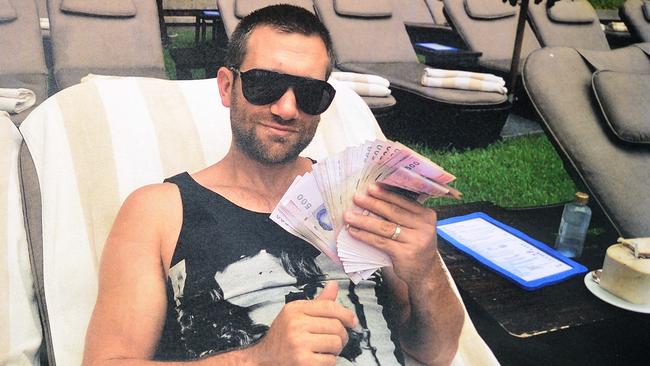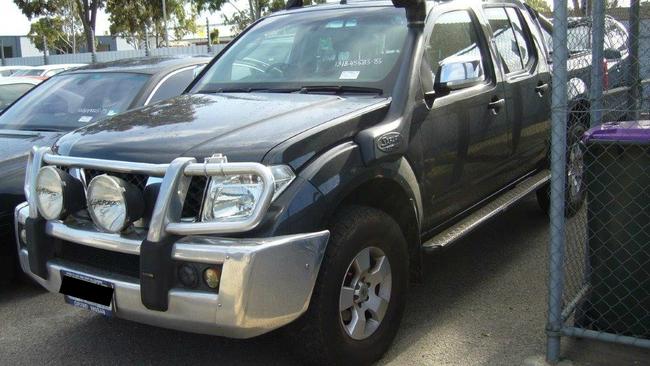Criminals switch to hiding cash in cyberspace to thwart police
SA Police has revealed the cutting-edge techniques criminals are using to hide and launder their dirty money ... as victims of one of SA’s most notorious scammers are finally getting their cash back.

National
Don't miss out on the headlines from National. Followed categories will be added to My News.
SOUTH Australian criminals are laundering huge amounts of cash by buying digital currencies such as Bitcoin in an effort to hide their assets and thwart police activities to seize them.
Senior police have revealed while they restrained a record amount of property — just over $45 million worth — last year, investigations had uncovered examples of criminals who had considerable amounts of cryptocurrencies at their disposal.
In one case, a man charged with drug trafficking had $700,000 worth of Bitcoin in his virtual wallet that detectives suspect may have come from his illegal activities.
Many other instances have also been encountered in which large amounts of cash in bank accounts has been found and subsequently traced back to Bitcoin accounts.
Commercial and Electronic Crime Branch Operations Detective Inspector Rob Papworth said detectives were encountering this scenario frequently as criminals took advantage of new technology to both launder drug money and purchase large quantities of illegal drugs.
“This has required a change in investigation tactics by police to maximise opportunities to identify proceeds of crime,’’ he said.
“In more and more of our cases, there is Bitcoin in the background. We have not seized any Bitcoin yet, but certainly the proceeds of the Bitcoin.

“Eventually it will come back to a bank account and they will want to use it themselves. That is where we will seize those funds after it has been converted.’’
“Or alternately when we do our financial analysis we see a lot of money that was formerly Bitcoin.’’
While seizing Bitcoin is a complex and difficult process because of the layers of technology involved, police in Victoria and some overseas jurisdictions have successfully done so in confiscations investigations.
“We can seize it and are developing the knowledge to be able to do that,’’ Detective Insp Papworth said.
“We will be doing that into the future. More and more digital currencies are emerging.
“The anonymity of the cyber environment provides an environment and that opportunity for criminals.
“We have the ability to pursue the proceeds of crime in both the virtual and physical environment.’’
Last financial year, police restrained $45,189,070 worth of property in 289 investigations. The property consisted of houses, luxury cars, boats and cash. That figure is a 25 per cent increase over the previous year’s figure of $34.2 million.
The value of restrained property has risen steadily in recent years as investigati1onal tactics have altered. In 2011/12, just $11.1 million was restrained.

Once a criminal has been convicted, formal forfeiture proceedings are launched by the Office of the Director of Public Prosecutions. Such proceedings, usually conducted in the District Court, can take several years before a court order is made to forfeit assets. The proceeds are deposited in the Victims of Crime Compensation Fund.
While the majority of the investigations have involved drug traffickers and lower level drug dealing, they have included other organised crime matters, keeping brothels, homicides, major fraud cases and deceptions.
“It can cover any offence of a serious nature, but probably 95 per cent of our jobs will be drug-related,’’ Det Insp. Papworth said.
In the majority of cases, officers from the confiscations section were enlisted in the early stages of an investigation. Crucially, nine forensic accounts were now used by the branch as part of these complex investigations.
And likewise, the targets of the investigation also employ their own specialists to help them conceal their assets and wealth. They include lawyers, specialist accountants, advisers and real estate agents.
“While there is no suggestion that these professionals are breaking any laws, our forensic accountants have the specialist skills to trace the sources of assets and wealth accumulation and to unravel complex financial webs,’’ Det Insp. Papworth said.
While some of the investigations involve major drug traffickers, a significant number involve minor dealers who simply use the cash they generate to purchase high performance cars and motorcycles as part of their lifestyle.
“We have seized Ferraris, BMWs as part of this … and one boat was worth $120,000,’’ Det Insp. Papworth said.
“But it also goes down to things like jet skis in other jobs.’’
“It is an effective tool to create a hostile environment for organised crime and individuals involved in serious criminal activity — and we are always looking for opportunities to improve it.’’

Old-fashioned scammer’s cash clawed back
NICHOLAS Lowe built an empire using money he stole from victims of crime — and now it has finally been returned to them.
The estate of the former Crown Solicitor’s Office law clerk has just been liquidated and the $450,000 proceeds returned to the Victims of Crime Fund — from where Lowe stole it.
Lowe, who pleaded guilty to 26 aggravated counts of dishonestly dealing with documents, is serving a 20-year jail term for these offences and a savage attempted murder he committed in 2003 that he was only linked to through DNA following his arrest in 2012.

Between October 2008 and August 2012, Lowe used his position to defraud $1.135 million from the Victims of Crime compensation fund.
Lowe had delegation to approve claims of less than $10,000, the majority of those paid out of the fund, and did so in the names of the men who served as his co-conspirators.
He sent them undeserved compensation and they returned half the value of each cheque to him, providing him with $491,200 which he used to fund an extravagant lifestyle.

As part of Operation Affirm, confiscations detectives recovered just over $450,000 in cash through the sale of assets belonging to Lowe and his co-conspirators.
Lowe’s heavily mortgaged luxury home at Henley Beach South fetched $895,000 when sold in April, cash was realised from his bank and superannuation accounts and his BMW and Nissan Navara and firearms sold.
Of the total returned to the fund, $165,000 was realised by selling assets belonging to his co-conspirators.

Lowe’s wife Andrea, who was placed on a 14-month good behaviour bond for her role in attempting to destroy evidence of the fraud, lost a District Court bid to retain the family home.
“This case was a pretty good result and a really good example of how the legislation can be used in dealing with an individual engaged in serious crime,’’ Confiscations Section Brevet Sergeant Mark Hay said.
Originally published as Criminals switch to hiding cash in cyberspace to thwart police


